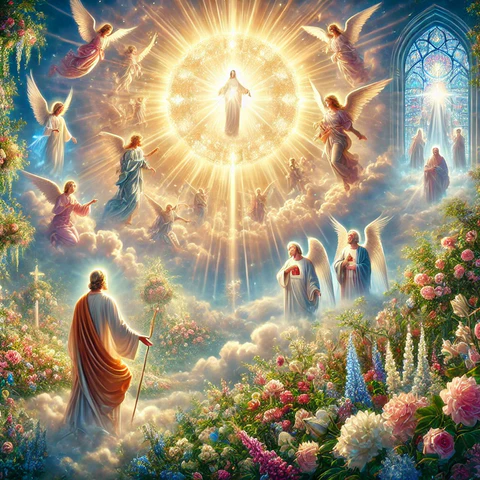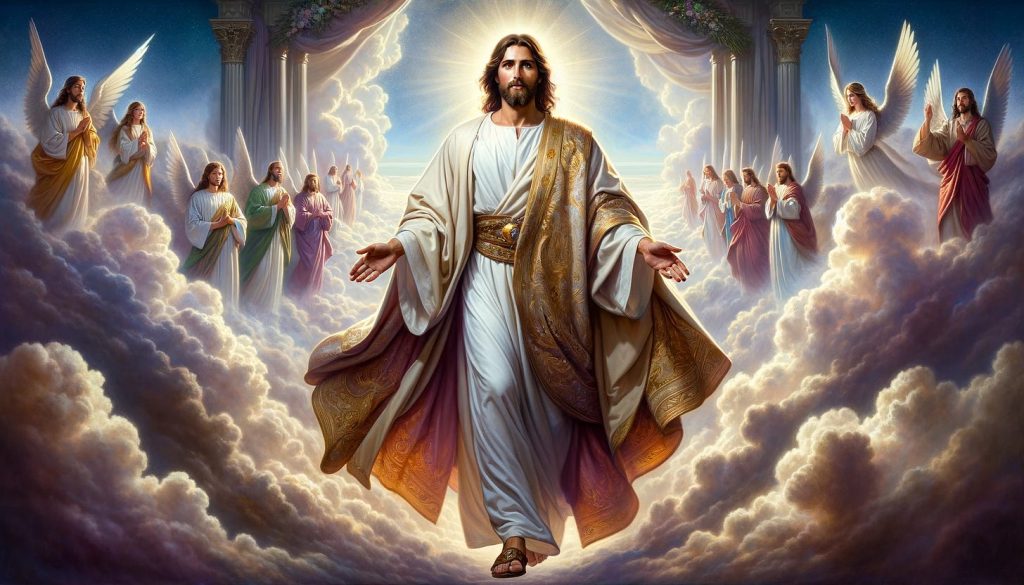
The Catholic understanding of Heaven, Hell, and Purgatory offers a profound vision of what awaits us after death. Rooted in Scripture, Sacred Tradition, and centuries of Church teaching, these three realities represent the ultimate destinies of the human soul — eternal communion with God, eternal separation, or a purifying journey toward glory.
🌟 Heaven: Eternal Life with God
At the heart of the Catholic understanding of Heaven, Hell, and Purgatory is Heaven — the final goal of every Christian life. Heaven is described as the Beatific Vision (cf. Catechism of the Catholic Church 1023): the direct, face-to-face encounter with God where we experience perfect love, joy, and peace.
Jesus promised this place to His faithful followers:
“In my Father’s house there are many rooms… I go to prepare a place for you” (John 14:2).
Heaven is not merely a location but a state of being — a complete union with God, free from pain, sin, and death. All desires are fulfilled, and eternal happiness becomes our reality.
Key Catholic beliefs about Heaven:
- It is the reward for a life of faith, love, and obedience.
- All saints and angels dwell there in everlasting worship.
- Earthly suffering finds its ultimate meaning and reward in Heaven.
🔥 Hell: Eternal Separation from God
Another essential part of the Catholic understanding of Heaven, Hell, and Purgatory is Hell — the tragic consequence of rejecting God’s love. The Church teaches that Hell is a real and eternal state where souls suffer complete separation from God (see Catechism 1033).
“They will go away to eternal punishment, but the righteous to eternal life” (Matthew 25:46).
Hell is not a punishment God imposes arbitrarily; it is the soul’s own choice to turn away from grace. God respects human freedom — even if that means eternal alienation.
Key Catholic beliefs about Hell:
-
Mortal sin, unrepented before death, leads the soul there.
-
Hell involves spiritual suffering — regret, darkness, and the absence of love.
-
God desires no one to perish (2 Peter 3:9), yet respects our freedom.
🔥 Purgatory: The Path of Purification
Completing the Catholic understanding of Heaven, Hell, and Purgatory is the doctrine of Purgatory — a merciful stop for souls destined for Heaven but still needing purification. According to Catechism 1030–1031, it is a temporary state where imperfections are cleansed before entering God’s presence.
The Bible supports this concept indirectly:
“Nothing unclean will enter [Heaven]” (Revelation 21:27).
“He will be saved, but only as through fire” (1 Corinthians 3:15).
Key Catholic beliefs about Purgatory:
-
It is not a second chance but a final purification.
-
Prayers, Masses, and indulgences offered by the living help souls there.
-
Souls in Purgatory are assured of Heaven after their cleansing.https://www.vatican.va/archive/ENG0015/__P2N.HTM
Living in Light of Eternity
The Catholic understanding of Heaven, Hell, and Purgatory isn’t just theology — it shapes how we live today.
-
It motivates us to grow in holiness and charity.
-
It reminds us of the urgency of repentance and forgiveness.
-
It calls us to pray for the departed, trusting God’s mercy.
The Church also offers practical help for our journey: the Sacraments, especially Confession and the Eucharist, strengthen our souls. Regular prayer, reading Scripture, and works of mercy prepare us for eternal life.
Why Other Churches Do Not Believe in Purgatory
While the Catholic understanding of Heaven, Hell, and Purgatory is rooted in both Scripture and Sacred Tradition, many Protestant churches reject the doctrine of Purgatory. Their reasons often include:
-
Sola Scriptura: Many non-Catholic Christians believe that because the Bible does not explicitly use the word “Purgatory,” the doctrine is not biblical.
-
Christ’s Complete Sacrifice: They argue that Jesus’ death and resurrection fully paid the price for sin, so no additional purification is necessary after death.
-
Interpretation of Biblical Texts: While Catholics interpret passages like 1 Corinthians 3:15 and 2 Maccabees 12:44–46 as support for Purgatory, many Protestants see them as metaphorical or not referring to the afterlife.
The Catholic Church, however, teaches that Christ’s sacrifice is indeed sufficient, but the purification of the soul is a process of applying that grace — much like sanctification on earth. Purgatory is not about earning salvation; it’s about being perfectly prepared to enter Heaven, as Scripture says:
“Nothing unclean will enter it” (Revelation 21:27).
This respectful explanation shows the difference without condemning others, and it helps your readers understand why Catholics believe what they believe even when others disagree.
✝️ Conclusion: Hope Beyond This Life
The Catholic understanding of Heaven, Hell, and Purgatory is not meant to frighten us but to guide our hearts toward eternal truth. It reminds us that life does not end with death — it continues into eternity, where our choices and relationship with God shape our final destiny. Heaven is our ultimate home, Hell is the tragic result of rejecting God’s love, and Purgatory is His merciful gift that prepares souls for perfect union with Him.
This teaching calls every believer to live a life of faith, repentance, and love, trusting in God’s infinite mercy and striving to grow closer to Him each day. As we journey through life, let us keep our eyes fixed on Heaven, avoid the path that leads away from God, and pray fervently — for ourselves and for those who have gone before us — that we may all one day rejoice together in the presence of our loving Creator.
FAQs on Catholic Understanding of Heaven, Hell, and Purgatory
1. Does the Catholic Church believe Heaven is a real place?
Yes. Heaven is both a real state of being and a real destiny where we live in perfect union with God forever.
2. Can a loving God send anyone to Hell?
God does not “send” souls to Hell — people freely choose separation by rejecting His grace through mortal sin.
3. Is Purgatory in the Bible?
While the term “Purgatory” is not explicitly mentioned, passages like 1 Corinthians 3:15 and 2 Maccabees 12:44-46 support the concept of post-death purification.
4. Can prayers really help souls in Purgatory?
Yes. The Church teaches that prayers, Masses, and sacrifices offered by the living assist souls on their way to Heaven.
5. Will everyone eventually go to Heaven?
No. The Church teaches that salvation requires free acceptance of God’s grace. Some may reject it eternally.
6. Is Hell eternal?
Yes. According to Jesus’ own words (Matthew 25:46), Hell is eternal — a permanent consequence of unrepented mortal sin.
7. Can we know if someone is in Heaven or Purgatory?
The Church canonizes saints (declaring them in Heaven) but does not definitively pronounce on the fate of individual souls otherwise.

